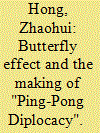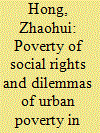| Srl | Item |
| 1 |
ID:
018237


|
|
|
|
|
| Publication |
Nov 2000.
|
| Description |
429-448
|
| Summary/Abstract |
With the aid of the 'butterfly effect' theory, this article investigates the role of ordinary individuals, both Chinese and American, in the formulation, implementation and promotion of 'Ping Pong Diplomacy', which brought about the US–China rapprochement in the early 1970s. Through examining the twists and turns in the process of 'Ping Pong Diplomacy' making, this study intends to bring one's attention to a number of seemingly less significant historical episodes and their long-term impact on US–China relations. Like small butterflies whose spontaneous actions can generate unexpected climatic changes, the various individuals in this study, including players and officials of the table-tennis teams, low-ranking diplomats and journalists, played an indispensable part in bringing forth a dramatic transformation in US–China relations, which in turn altered the Cold War climate in general.
|
|
|
|
|
|
|
|
|
|
|
|
|
|
|
|
| 2 |
ID:
075501


|
|
|
|
|
| Publication |
2005.
|
| Summary/Abstract |
This article, drawing references from popular theories of social exclusion, capability and civil rights, develops a concept-the poverty of social rights-in the causal analysis of poverty. The author believes that deficiency of economic resources and working capability are not the only reasons for urban poverty; in fact, the lack of social rights on the part of the disadvantaged sectors of society constitutes simultaneously the cause and consequence of urban poverty. The article defines the concept of poverty of social rights and its characteristics, and analyzes its China phenomenon. In the end the article poses several options and remedies for China's poverty-relief efforts through designing and implementing a Chinese-style affirmative action.
|
|
|
|
|
|
|
|
|
|
|
|
|
|
|
|